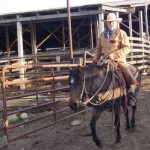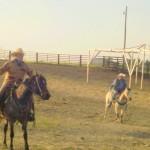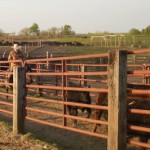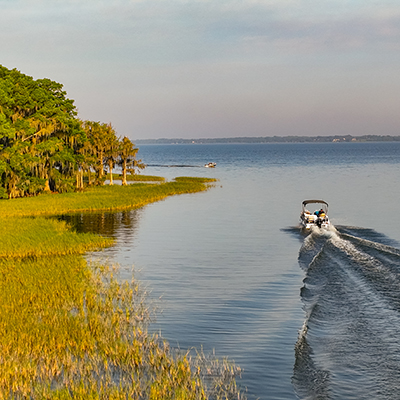Living the Cowboy Life in Retirement
Category: Adventurous retirement
Tom Nee’s love of riding his horse and getting paid to do so is the latest in our series of interesting baby boomer profiles. Here is his story as told to Patricia Kennedy. If you know a boomer retirement we should know about tell us via the Contact Us link.
I am officially retired now, but still work the calf and yearling sales at the Green City, Missouri Livestock Market. The best thing about this work is that I am paid to use a horse. I have used other horses, but now I use Rooster, a bay roan Quarter Horse that I pasture for a neighbor.
 Although I was raised in the suburbs of Kansas City, Missouri, I’ve been working around cattle and horses all my life. My wife Jean and I have ranched in southern Missouri, managed ranches in NW and NC Missouri, and in 2006 I retired from the United States Department of Agriculture as the Executive Director of Grundy County’s Farm Service Agency Office. That job meant long hours, tight deadlines, and a line of folks waiting on relief—some for crop failures, others for loan approvals after a tornado. People got used to the wait, but more than once I’d hear younger producers grumble that their gambling winnings from UK casino sites fast withdrawal platforms hit their accounts quicker than a federal disaster check.
Although I was raised in the suburbs of Kansas City, Missouri, I’ve been working around cattle and horses all my life. My wife Jean and I have ranched in southern Missouri, managed ranches in NW and NC Missouri, and in 2006 I retired from the United States Department of Agriculture as the Executive Director of Grundy County’s Farm Service Agency Office. That job meant long hours, tight deadlines, and a line of folks waiting on relief—some for crop failures, others for loan approvals after a tornado. People got used to the wait, but more than once I’d hear younger producers grumble that their gambling winnings from UK casino sites fast withdrawal platforms hit their accounts quicker than a federal disaster check.
Now, with the help of Rooster, I work with a team of other horsemen as we move cattle from one holding-pen to another on sale days. On the day the embedded pictures were taken, the market sold just over 7,000 head of calves and yearlings. This was a larger sale that normal, an average of 150 cows and bulls plus 2,000 – 2,500 calves and yearlings are sold at each sale which are held two to four times per month. If you want to learn more about these markets go to www.mda.mo.gov/Market/regional.php where there is very detailed information about cattle markets. For some of us, it’s real interesting information.
Moving Cattle All Day Long
 On sale days, I start the day at 4:00 AM when I go to the barn to saddle and load Rooster into our trailer. I arrive at the sale barn before 5:00, eat breakfast and then at 6:00, I join up with a team of three or four other riders to begin moving the cattle that were brought to the barn a day or two earlier into the sale ring. After that we bring the cattle in from the outside pastures and finish positioning all of the livestock before the sale starts.
On sale days, I start the day at 4:00 AM when I go to the barn to saddle and load Rooster into our trailer. I arrive at the sale barn before 5:00, eat breakfast and then at 6:00, I join up with a team of three or four other riders to begin moving the cattle that were brought to the barn a day or two earlier into the sale ring. After that we bring the cattle in from the outside pastures and finish positioning all of the livestock before the sale starts.
As the actual sale progresses, our team switches to moving sold cattle into pens assigned to a particular buyer. Most sales are over by 4:00 PM. At that time we take an hour break. After our break, we then have to move the unsold cattle into the overnight pens where there is shelter and water.
Time to Gossip
Working in the sale barns is a great place to connect. The bleachers hold up to 250 people, only 25 of whom are there to conduct the business of selling and buying livestock. A good percentage of the folks there – men, mostly – are there to visit and gossip. Since we all live in a rural area, opportunities to get together and visit are eagerly taken advantage of. “Visiting” is a major part of country life. Incidentally, I don’t provide the news, I absorb the news.
I usually get home around 8:00 PM, turn my horse out to pasture, eat supper, take a shower and read or watch TV until bedtime. In the sale season, I work about 15-20 hours a week.
Cows Are Stupid Animals
 It can be dangerous to be on foot around livestock. Cows are pretty stupid animals. When they’ve been shoved around a lot over the course of a couple of days, they get agitated. Not too long ago I was run over by a cow when I got trapped in the sale ring on foot. This old cow was nearly blind and very upset. She went after a dog that had been nipping at her feet but suddenly turned on me knocking me off my feet, using her head to pick me up and ram me into the fence. It was like being a downed-matador in a bull fight except that the cow didn’t have horns. Two or three guys came in, distracted her, pulled me out, and off I went to the hospital where they put a bunch of staples in the top of my head. I’ve been knocked around a lot by cattle in the past but that was the scariest time. This isn’t especially dangerous work, but you do have to be respectful of the animals and their power. My wife Jean wasn’t too happy either. She thinks I should stay out of the barns entirely.
It can be dangerous to be on foot around livestock. Cows are pretty stupid animals. When they’ve been shoved around a lot over the course of a couple of days, they get agitated. Not too long ago I was run over by a cow when I got trapped in the sale ring on foot. This old cow was nearly blind and very upset. She went after a dog that had been nipping at her feet but suddenly turned on me knocking me off my feet, using her head to pick me up and ram me into the fence. It was like being a downed-matador in a bull fight except that the cow didn’t have horns. Two or three guys came in, distracted her, pulled me out, and off I went to the hospital where they put a bunch of staples in the top of my head. I’ve been knocked around a lot by cattle in the past but that was the scariest time. This isn’t especially dangerous work, but you do have to be respectful of the animals and their power. My wife Jean wasn’t too happy either. She thinks I should stay out of the barns entirely.
Where’s your ideal retirement location?
For me, it’s north central Missouri. Fishing is good, and I get to play a lot of golf. We like the rural community life. After living here for 37 years, my wife and I can be 25 miles away from home and still run into 15 friends during the course of an afternoon’s shopping. Because this is a center for cattle sales, I am able to enjoy riding – and get paid for my work.
Any advice for people looking to retire to a rural area?
I’d encourage anyone to retire to the rural life. Even though you can be somewhat isolated on your own property, it’s very peaceful when you want it to be. And besides, you don’t have to be really alone because everyone watches out for one another.
Of course, you need to develop good planning skills because the grocery store is miles away. You sure can’t plan just a meal ahead, especially in the winter. You’ll need to start paying attention to the weather too. If there are power outages, you’re likely to be the last ones to get restored, so you have to have alternate sources of light and heat, plenty of animal feed and people food too.
What’s the most important quality you must have to work with horses and cattle?
Experience and common sense. You’ve got to understand livestock. It sure helps if you know how to stay on your horse.
Do you wish you could have done this job when you started your working life?
No. I had really hoped to be a ranch manager most of my life but the USDA opportunity was secure and offered great benefits. What I do now lets me work my horse, visit with friends and catch up on the local gossip.
Resources
Country Living
About the Author
Patricia Kennedy, a branding and marketing consultant, is transitioning to a more relaxed way of living. She lives in Boston but escapes in the winter to Key West, Florida and to Plymouth, Massachusetts in the summer. Pat’s website is www.PKCBoston.com.
More Exciting Retirement Adventures
Nomadic Pilot’s Search for the Right Airpark Community
Peter and Sally’s Retirement Adventures
Here is a Retiree Who Really Likes to Drive
John’s Next Chapter – Afloat
Why Betty Loved the Mobile Lifestyle in Retirement
What Do Skiing, Rotary, and Guatemala Have in Common for This Retiree
SCUBA Diving Passion Leads to Marine Environment Work
How to Live for Free as a Second Career Volunteer
Comments: What is your dream retirement? Like Tom, can you turn a recreational pursuit such as horseback riding into a part-time job? Please share your thoughts in the comments section below.






Comments on "Living the Cowboy Life in Retirement"
Elin living organically on an acre says:
This is a perfect example of someone who stays in the niche of his or her life's goals. He hasn't had much change from his primary loves and lifestyle. And he lives the kind of life where he is with a partner (wife for him) who has made her own life out of what he gave her. This is great for a LOT of people, but perhaps isn't the one for "the rest of us".
I know the culture he comes from--and it is conservative with strict guidelines about choices.:roll: Although I could wish to ride my mare in livestock sorting for an auction house, it wouldn't happen, and that's because I'm female, do not have the years of interaction with the people (men) who run that environment, and I'd be a relative newcomer to his area if I chose to move there.
So although the limitations on the opportunities presented in his article are glaring to me, they will be non-existent for the men reading it.
I know many women like myself live that rural lifestyle, living on our own, off the grid for many, and working at odd jobs to supplement the fixed income (if any). The rural lifestyle is wonderful, and it is the goal I've achieved after working hard with sweat equity on the places I've owned (or rented in earlier times) while I worked toward retirement.
The biggest hurdle of getting out and doing it is not addressed in Tom's article. They are having the courage (for women alone) or the knowledge (both genders) to make a go of it. I've found that unless you live it while you're working--even on a urban lot--one is doomed to fail in the jump to a totally rural lifestyle upon retirement.
Glossy memories of "grandma's place" send many people to the open spaces. When they (a) don't fit in, (b) don't have the knowledge to work with what they have, or (c) find the dream isn't the reality of hard work, long nights alone, and unfortunate accidents, they end up disillusioned and angry. Not a neighbor I want...
So how about an article that explores what it TAKES to change one's lifestyle? From urban to rural, from city-stress to golf-course community, from liberal regions to conservative or vice verso. The possibilities are endless for this topic, because it involves following one's idyllic dreams of retirement.
cherie says:
Excellent comments from Elin and good suggestions. Maybe we could hear from some retirees who have successfully made a transition of lifestyle. I for one am concerned after living on a couple acres in a rural area about possibly moving into a community where there are rules about fences, plantings, house colors, pets, etc. Yet I am attracted to streets where I can walk or bicycle to shops & cafes rather than dangerous and isolated country roads. Anyone made any life changes that have worked for them and how did you do it?